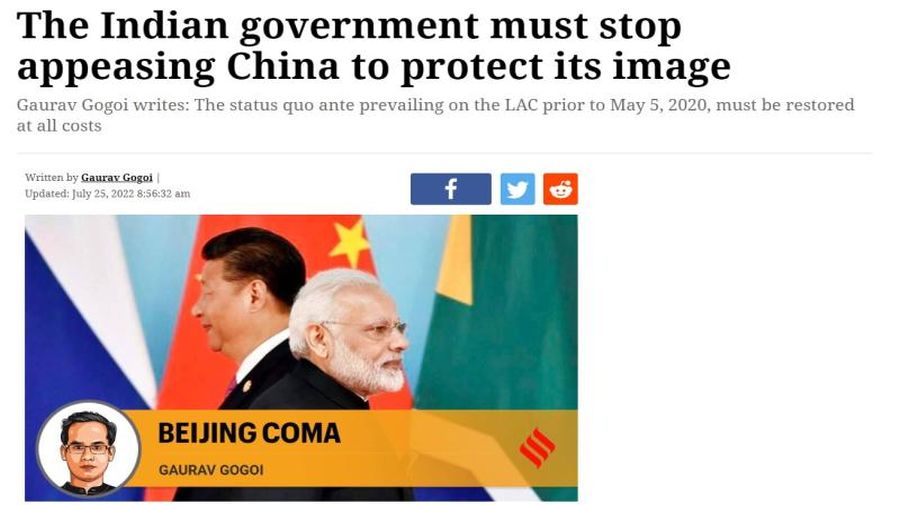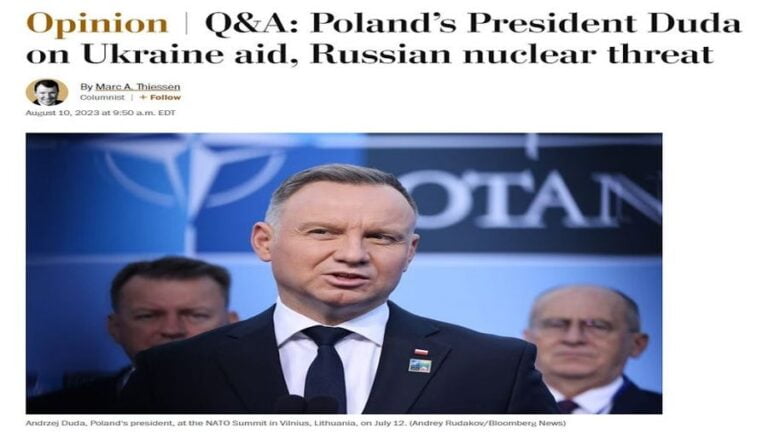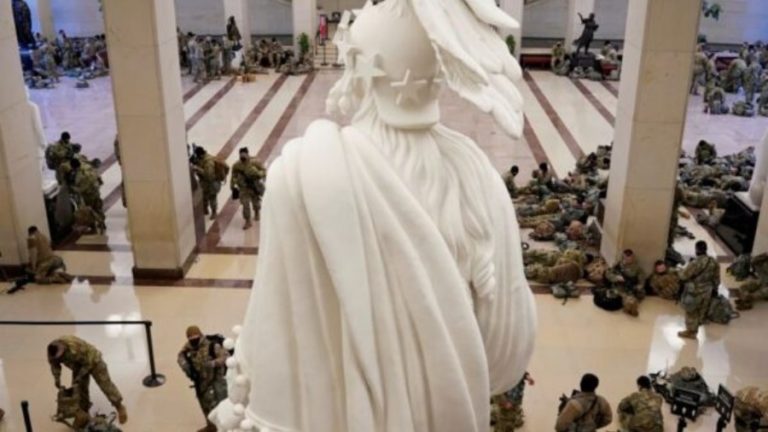The Indian Opposition Is Doing America’s Bidding by Beating the Drums of War Against China
Gogoi’s game is to gaslight the public into forgetting everything they’ve learned about the complex intricacies of defense and foreign policy formulation, especially regarding China, and instead accept his innuendo that decades-long disputes can be resolved within days if only Delhi were to exert maximum pressure on the People’s Republic.
Outsider observers have fallen under the impression over the years that the ruling BJP is supposedly more aggressive than the opposition Indian National Congress (INC), but the reality has recently become the opposite as proven by the latest op-ed by Gaurav Gogoi, the Deputy Leader of the INC. In his article about why “The Indian government must stop appeasing China to protect its image” that he just published at The Indian Express, this prominent politician spun a narrative that portrays the BJP as not only weak in the face of the so-called “China threat”, but even implies that it’s treasonous by questioning why trade between the two has increased in spite of their unresolved border disputes.
The solution, Gogoi suggests, is to adopt a much more muscular approach against the People’s Republic. It’s easy for him to make such a policy prescription when his party isn’t the one in charge of defense or foreign policy, which means that he can launch cheap demagogic potshots at the ruling authorities in the hopes of maybe winning a few more votes for his side during the next elections in some precincts. His interpretation of events since the summer 2020 Galwan River Valley clashes is oversimplistic and deliberately so, being obviously designed to mislead uninformed members of his target audience. Gogoi hopes that they’ll give him the benefit of the doubt and not ask any detailed policy questions.
Therein lies the crucial flaw with his latest information warfare product, however, since the Indian electorate is more informed than the INC believes. Whatever one’s criticisms about the ruling BJP may be, there’s no doubt that its latest tenure from 2014 onward has seen the public become much more engaged with defense and foreign policy than during previous administrations. That in turn enabled them to learn a lot more about how such policies are formulated in practice instead of how they’re opportunistically presented by opposition politicians who hope to manipulate the public ahead of the next elections.
Gogoi’s game is to gaslight the public into forgetting everything they’ve learned about the complex intricacies of defense and foreign policy formulation, especially regarding China, and instead accept his innuendo that decades-long disputes can be resolved within days if only Delhi were to exert maximum pressure on the People’s Republic. Put another way, his approach appears ripped from the playbook of American information warfare in that it’s aimed at deliberately oversimplifying an extremely difficult situation in order to generate artificial anger against the authorities that can subsequently be exploited. In this context, he hopes to manipulate Indians into braying for war against China.
The Deputy Leader of the INC knows very well how mutually disadvantageous any further clashes between these two Asian Giants would be, let alone an all-out war, but he doesn’t seriously expect that to happen as a result of his article. Rather, he’s just hoping to rebrand his party as supposedly being “tough on China” in a desperate attempt to reverse its unprecedentedly low popularity with time. This time perception management plot is based upon the false presumption that the Indian public is so uneducated as to unquestionably believe his oversimplistic narrative about this very sensitive national security issue that’s affected their civilization-state for decades already.
If it was truly that easy to resolve, then it would have already been done the last time that the INC ran the country, or the BJP could at least have wrapped everything up on its own by now and rightly taken credit for it. The truth, however, is that Indian-Chinese relations remain extremely complicated. On the one hand, the unresolved border disputes add a very unfriendly dimension to bilateral relations, but on the other, ties have noticeably improved in recent months from their nadir in summer 2020 as a result of India proudly flexing its strategic autonomy vis a vis the West with respect to retaining its close relations with Russia. Furthermore, bilateral trade remains mutually beneficial in spite of everything.
War is never the first recourse for resolving any situation, and the only ones who claim otherwise either aren’t qualified to be making that decision or are purposely trying to sabotage whoever it is that they’ve shared that counterproductive “advice” with. As regards Gogoi, it’s difficult to know exactly what his true intentions are beyond the short-term opportunism that’s obvious to any observer, but that’s all the more reason to suspect him of ulterior motives since beating the drums of war against China advances America’s divide-and-rule interests whether he’s conscious of it or not. Building upon that point, there’s some more that could be said to add some further insight.
The INC used to be a very popular party but it lost everything that it built over the decades due to its comprehensive mismanagement. Instead of evolving with the times in line with how the same people who it’s supposed to represent have already done, it remained chained to the past for ideological and nostalgic reasons, which predictably made it outdated and was why voters decisively turned against it from 2014 onward. The INC isn’t just a shadow of its former self since it actually bears almost no resemblance whatsoever to what it had once been. The behavior of its representatives isn’t that of those who inherited a once-great party, but of neophytes who don’t even know their own country.
Gogoi is going about everything the wrong way: he thinks that he’s read the pulse of the Indian people by imagining that they’ll suddenly ditch the BJP in favor of the INC so long as his party brays for war against China (and, whether he realizes it or not, does America’s divide-and-rule bidding), but the reality is that Indians already know what the game is and don’t want to play it. They’ve seen how aggressively the US has waged its infowar on their country since the start of Russia’s ongoing special military operation in Ukraine and are on high alert for any other tricks, including devious ones such as operating within their political system via opposition proxies who do its bidding (even without being told).
The last thing that South Asia needs right now is another big war, yet that’s precisely what Gogoi is agitating for in spite of it being counterproductive for his civilization-state’s objective national interests. That’s why India’s present defense and foreign policy, which carefully balances these same interests in their currently very complex context amidst the global systemic transition to multipolarity, is so popular among the masses. They’ve listened to External Affairs Minister Jaishankar as he compellingly articulated India’s interests over the summer and trust in his ability to implement the Prime Minister’s multipolar vision, even if it takes time to achieve tangible results like in the case with China.
Nevertheless, it shouldn’t be forgotten – not least by Indians themselves – that theirs is a millennia-old civilization that has proven its strategic patience over the centuries. That’s not to say that it’ll take 100 years or so to resolve India’s problems with China, but just that expecting them to be patched up within a few days of adopting the more muscular approach that Gogoi is going gaga over isn’t just unrealistic, but also disrespectful to their civilizational experience. It condescendingly presumes that Indians have the historical memory of modern-day nation-states, which isn’t to disrespect the second-mentioned, but just to point out that there’s no comparison between them in this respect.
All of this just goes to show how out of touch Gogoi and the INC really are with the same people who they claim to represent. Far from reading society’s pulse, they’ve once against miscalculated it by wrongly assuming that everyone will jump on their party’s anti-China bandwagon and thus propel them to victory in the next elections. Failing that, they might even be hoping for some media and political support from the US simply because they’re doing its bidding by trying to provoke a major war in Asia between its largest Great Powers. This observation is a serious reason for concern and should make one wonder what other narrative tricks Gogoi’s got up his sleeve and where exactly he got them from.







